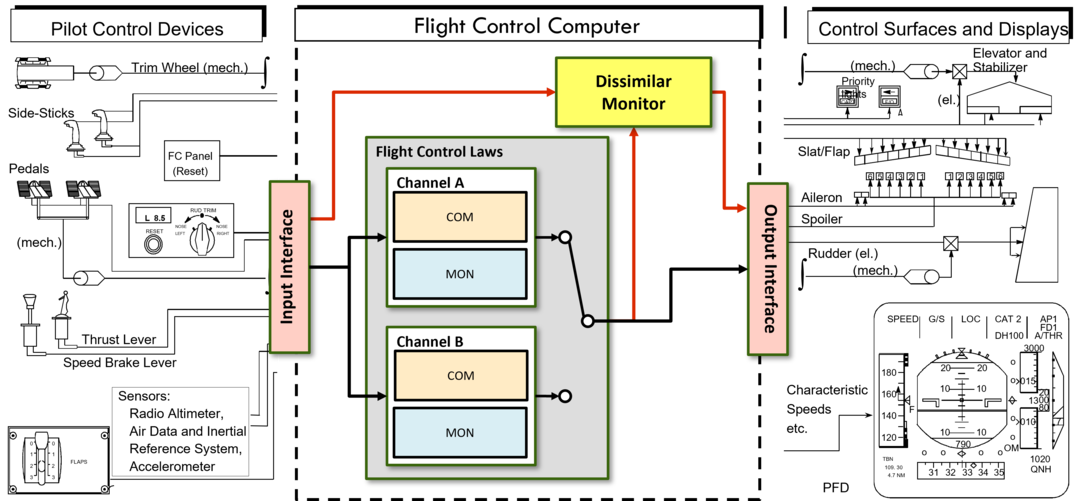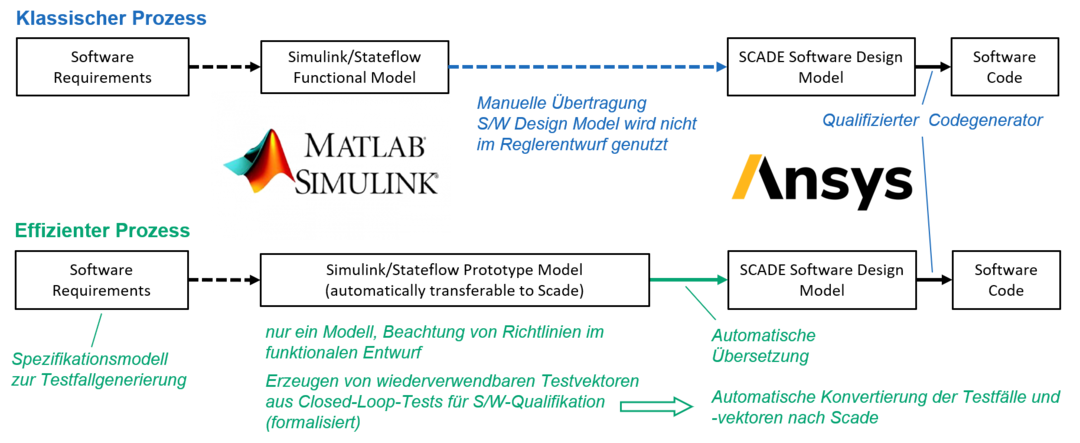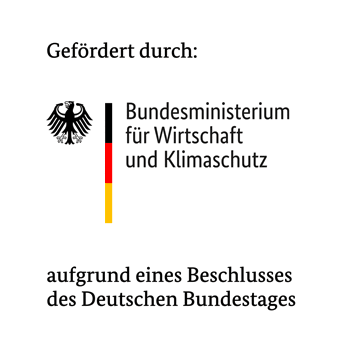MODULAR-TUB – Model-based Software-Development for digital intelligent Flight Control Systems
MODULAR-TUB is a partner project at TU Berlin as part of the joint research project MODULAR (Smart Actuator Concepts for electromechanical und electro-hydraulic Drives). MODULAR aims to develop innovative concepts for smart electromechanical and electro-hydraulic actuators. It is funded by the Federal Ministry for Economic Affairs and Energy (BMWi) as part of its Federal Aviation Research Programme (LUFO VI-1). The planned project duration is 39 months (01.01.2020 – 31.03.2023). The joint research project is led by Liebherr-Aerospace Lindenberg GmbH.
Introduction
 © FMRA
© FMRA
The project MODULAR-TUB at TU Berlin contributes towards model-based software development of digital intelligent flight control systems and the development of new approaches for dissimilar control-monitor functions that are typically used in fail-safe safety-critical systems.
Flight control systems of modern commercial aircraft mainly use hydraulic actuators. Recent advances in power electronics make electric alternatives viable. Electromechanical actuators (EMAs) are already used in the secondary flight control system. The use in the primary flight control system is especially demanding in regards to reliability and service life of the actuators. Those systems are safety-critical and are therefore covered by strict development, certification and quality assurance processes.
Objectives
The joint research project MODULAR aims to develop innovative concepts for smart electromechanical and electro-hydraulic actuators. Research topics include more efficient methods for system design, new approaches in system monitoring and constructive solutions and control principles for electromechanical and electro-hydraulic actuators.
TU Berlin’s partner project MODULAR-TUB contributes by developing new monitoring mechanisms for next-generation flight control systems and work on efficient, model-based development processes of flight control software towards goal 4 (system capability) of the Federal Aviation Research Programme, as an understanding of the interaction of individual sub-systems (actuators, sensors, on-board computers) and the overall system “aircraft” are required. Mechanisms for the detection of Common Mode Failures contribute towards goal 2 (safe and passenger-friendly aviation).
The scientific and technical goals are:
- Requirements written in natural language are converted in a formal manner into executable specification models. These models are used to check the consistency and completeness of requirements in simulations and to define test cases and expected values. This allows an earlier verification of requirements in the development process (front loading). The models that are generated in the development process are reused, as functional models during design, for virtual integration, and as design models for generating source code.
- Currently flight control systems of commercial aircraft do not include dissimilar monitoring functions that detect Common Mode Failures in the specifications. New approaches based on observer methods are developed based on independent specifications. This contributes to increased dissimilarity of safety-critical functions in accordance with new EASA guidelines.
Project Plan
The joint research project consists of four main work packages (HAP):
| HAP1 | EHA & Test Environment | Innovative technologies for electro-hydrostatic actuators and test environment |
| HAP2 | FCS Rotary EMA | Intelligent digital Flight control system using load controlled electromechanical actuators |
| HAP3 | Highly integrated EMP | Highly integrated hydraulic electric motor pump with intelligent system monitoring |
| HAP4 | Electronics | Highly integrated and standardised electric drives |
MODULAR-TUB is part of HAP2.
Partners
- Liebherr-Aerospace Lindenberg GmbH
- Deutsches Zentrum für Luft- und Raumfahrt e.V. (DLR)
- Rheinisch-Westfälische Technische Hochschule Aachen (RWTH)
- Karlsruher Institut für Technologie (KIT)
- Technische Universität Chemnitz (TUC)
- Technische Universität Hamburg (TUHH)
- Fachgebiet für Flugmechanik, Flugregelung und Aeroelastizität (FMRA) der Technischen Universität Berlin
Tasks of the TU Berlin
 © FMRA
© FMRA
The Department for Flight Mechanics, Flight Control and Aeroelasticity is responsible for the tasks of TU Berlin. The tasks are part of three work packages (AP) and comprise the following topics:
- In AP 2.1, model-based system and software design methods (Model-Based Design, MBD) are applied to a primary flight control system, to demonstrate a model-based development throughout the development process and identify potentials for optimizing the process with regard to quality and efficiency. Functions that are implemented as software on flight control computers and actuator control electronics are implemented using MBD methods and corresponding tools. In addition, observer-based dissimilar monitoring functions for flight control systems are developed.
- In AP 2.2, the DLR will develop novel force control algorithms – instead of position control – for rotary EMAs to reduce gust loads and to simplify the flight control system. An additional research area is a control algorithm optimized for the lifetime of rotary EMAs. The goal is the development and validation of a design method for short stroke movements, as is typical for actuators in primary flight control and operational flight profiles. The associated control algorithms are implemented by DLR, based on the development process and associated standards formulated by TUB. Those algorithms are used as examples for the application of the model-based software development process. TUB supports the DLR during development and translates the resulting models to SCADE in AP 2.1 in preparation for integration and concluding validation on flight control computers by Liebherr in AP 2.4.
- In AP 2.4, the FMRA will support the project partners during validation of the results in extensive test campaigns on the component, device and system level.
Contact
Dominik Hübener
| Organization name | Flight Mechanics, Flight Control and Aeroelasticity |
|---|---|
| Office | F 5 |
Secretary
| Organization name | Flight Mechanics, Flight Control and Aeroelasticity |
|---|---|
| Office | F 5 |
| Room | F 337 |
Förderung
Project Duration: 01/2020 – 03/2023
LuFo VI-1
 © Bundesministerium für Wirtschaft und Klimaschutz
© Bundesministerium für Wirtschaft und Klimaschutz
